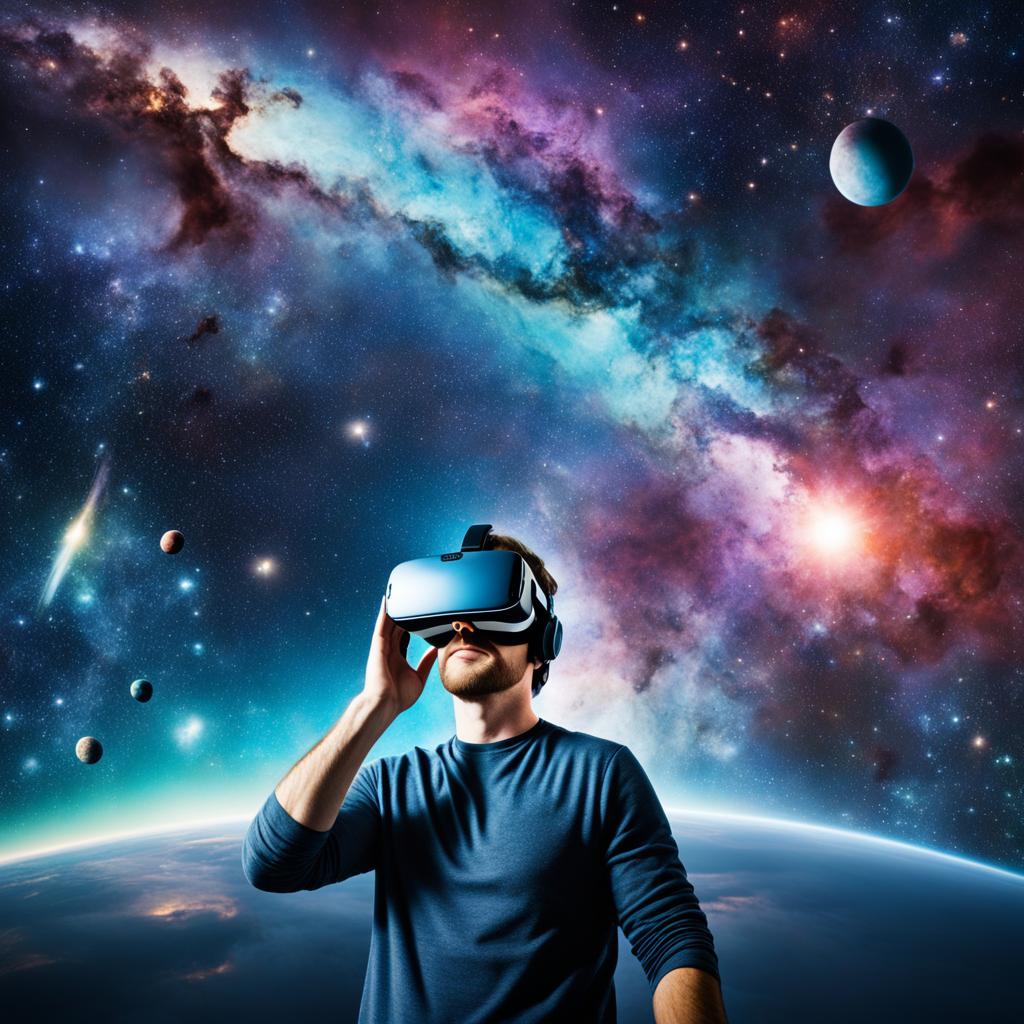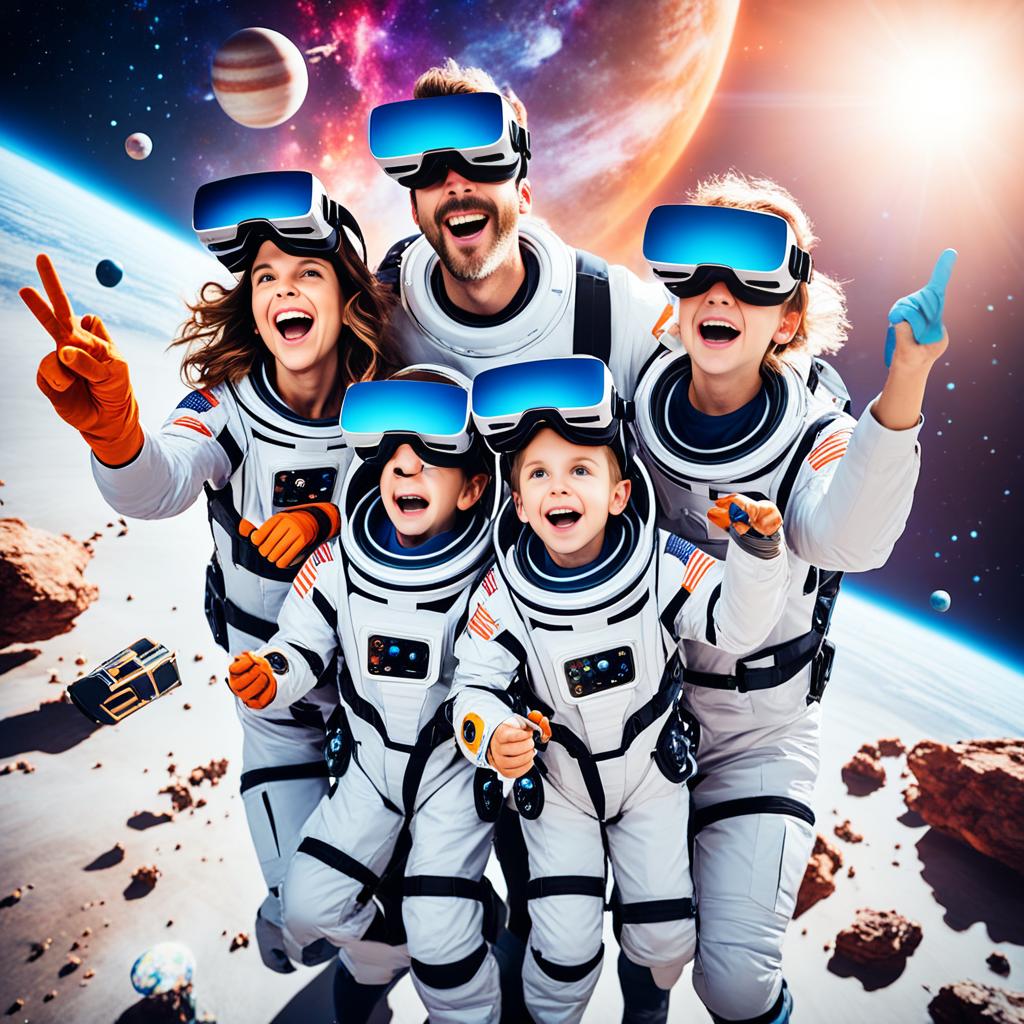Advertisements
A Virtual reality (RV) is a cutting edge technology which is revolutionizing the way we travel and explore the world around us. With the tecnologic innovation continuous, VR provides a immersive experience and captivating, allowing users to immerse themselves in a virtual environment 3D and interact with it in a unique way. That 3D simulation transports us to digitally created scenarios, giving us the feeling of being present in incredible places, such as outer space.
Imagine being able to explore the secrets of the cosmos without leaving the comfort of your home. With the Virtual reality, it is possible. Through VR glasses and specialized applications, we are able to travel to the stars, walk around the moon and even witness impressive celestial phenomena, such as the aurora borealis.
Advertisements
A immersive experience and realistic experience that VR offers brings a new dimension to the way we experience tourism. Now, we can go beyond physical borders and explore incredible places that would be inaccessible otherwise. In addition, VR also has applications in training employees in the tourism sector and in promotion and marketing in tourist destinations.
With the Virtual reality, we are opening new horizons for the tourism, combining cutting edge technology with the search for authentic and exciting experiences. Traveling through outer space has never been so easy and affordable. So, get ready to marvel at the magic of Virtual Reality and embark on this journey through the cosmos.
Advertisements

Main Topics
- Virtual reality and cutting edge technology
- Tecnologic innovation in the sector of tourism
- Immersive and simulated 3D experiences
- Applications of Virtual Reality in tourism
- Benefits and challenges of VR in the tourism sector
Virtual Reality in Tourism: Immersive Experiences
Virtual Reality (VR) has several applications in the tourism sector. One of them is Destination Simulation, which allows travelers to virtually explore the places they want to visit before they even book their trips. This experience gives users a more realistic sense of what to expect at their destination, helping them make informed choices.
VR is also used in training employees in the tourism sector, such as tour guides, allowing them to prepare in simulated conditions before dealing with real tourists. This ensures they are well prepared to provide accurate information and offer an enriching experience to travelers.
Another interesting application of VR in tourism is the creation of virtual Tourist Attraction Experiences in popular locations. This way, even those who cannot physically visit these attractions can have the opportunity to experience them immersively through VR. They can explore virtual environments that accurately reproduce the atmosphere and details of the attractions, providing an experience close to reality.
| Virtual Reality Applications in Tourism | Examples of Virtual Interaction | Virtual Environments |
|---|---|---|
| Destination Simulation | Virtual exploration before booking a trip | Virtual reproduction of tourist destinations |
| Employees training | Preparation of tour guides in simulated conditions | Virtual environments for training |
| Tourist Attraction Experiences | Virtual experience of popular attractions | Virtual environments faithful to the attractions |
Virtual reality in tourism offers the opportunity to virtually explore desired destinations, prepare to provide quality service as a tour guide, and experience popular tourist attractions without leaving home. With the technology in virtual reality apps, The virtual interaction becomes immersive, providing a unique experience for travelers. Carefully created virtual environments allow for an almost real experience, allowing users to transport themselves to tourist destinations and attractions without physical restrictions.
See too:
Promotion and Marketing with Virtual Reality in Tourism
In the tourism industry, Virtual Reality (VR) plays a key role in offering new and exciting possibilities for exploring and promoting destinations around the world. Through virtual experiences, we can attract travelers by providing samples of what they can expect when visiting specific tourist destinations.
Tourism companies have taken advantage of VR by offering virtual tours of their resorts, hotels and cruises. This way, customers can explore the facilities immersively before even making their reservations. This approach provides an authentic experience to potential travelers, encouraging them to make the decision to visit the location.
Additionally, many popular tourist destinations have created virtual experiences of its most emblematic attractions. This allows travelers to get an authentic glimpse before planning their trips, further sparking interest and desire to explore the location in person.
Promotion and marketing using Virtual Reality are effective strategies for attracting travelers and boosting the tourism industry. When offering virtual experiences captivating, we can arouse the interest of potential visitors, providing a preview of the wonders and charms of tourist destinations. This innovative approach allows people to have an emotional connection to the place before they even get there.
| Benefits of Promotion and Marketing with Virtual Reality in Tourism |
|---|
| Creating immersive experiences to attract visitors |
| Authentic sampling of tourist attractions |
| Increased interest and desire to visit the destination |
| Reducing uncertainty and indecision among travelers |
Therefore, promotion and marketing using Virtual Reality are powerful strategies to boost the tourism industry, allowing travelers to have an authentic and exciting preview experience of tourist destinations. This innovative approach gives us new ways to attract and engage travelers, highlighting the wonders and beauty of the world without leaving home.
Benefits of Virtual Reality in Tourism
Virtual Reality (VR) is revolutionizing the tourism industry, bringing with it a series of benefits that positively impact travelers and the sector as a whole. In this section, we will explore some of the key benefits of VR in tourism, including accessibility, saving time and money, It is sustainability.
Accessibility: Exploring Destinations Virtually
VR offers a new dimension of accessibility in tourism, allowing people with reduced mobility or physical limitations to explore destinations virtually. This makes the sector more inclusive and accessible to everyone, providing unique and immersive experiences without the physical barriers of real life. With VR, all travelers have the opportunity to enjoy incredible destinations and experience unforgettable experiences, regardless of their physical circumstances.
Saving Time and Money: Exploring More Destinations Virtually
VR offers a significant advantage in terms of saving time and money. With the ability to explore destinations virtually, travelers can save time and reduce costs associated with physical travel. Instead of visiting each potential destination in person, VR allows travelers to get a realistic and immersive preview of various locations before making their choices. This enables more efficient research and more careful planning, ensuring that each trip is well spent and meets travelers' expectations.
Sustainability: Reducing Environmental Impact
VR also contributes to sustainability of the tourism sector, reducing the need for long-distance travel and reducing the environmental impact of transport-related greenhouse gas emissions. By allowing travelers to explore destinations virtually, VR promotes a more conscious and eco-friendly approach to tourism. Reducing physical travel not only preserves the environment, but also contributes to the global economy by saving natural resources and minimizing infrastructure costs associated with traditional tourism.
Challenges of Virtual Reality in Tourism
Despite all the benefits provided by Virtual Reality (VR) in the tourism sector, we need to consider the challenges that arise with this technology innovative. Let’s explore some of the main challenges faced when using VR in tourism: content creation, real and virtual experience It is technological accessibility.
Content Creation
A content creation for VR can be a complex process, requiring significant investments in technology, equipment and expertise in design and development. Producing immersive experiences requires advanced resources and knowledge, which can make this process expensive and time-consuming for many companies.
However, despite these challenges, the content creation for VR also offers exciting opportunities for innovation. With the right combination of creativity and technology, we can transport travelers to wonderful destinations without them having to leave home.
Real and Virtual Experience
Although Virtual Reality is capable of providing immersive experiences rich in details, it is not possible to completely replicate the feeling of being physically present in a tourist location. There are subtle differences in experience between the real world and the virtual world.
Despite this, VR still offers a unique opportunity to explore destinations virtually, allowing travelers to get an authentic and exciting preview before planning their trips. The combination of real and virtual experiences can enrich the traveler's journey, offering an expanded perspective and improving decision-making.
Technological Accessibility
A technological accessibility represents another challenge in the use of VR in tourism. Not all travelers have easy access to the devices needed to experience Virtual Reality. This technological barrier can limit participation and prevent some travelers from experiencing the wonders of VR.
However, as technology continues to evolve, it is expected that accessibility be expanded, allowing a greater number of people to enjoy this immersive experience. As VR devices become more accessible and popular, the technological barrier is likely to decrease, leading to greater inclusion and participation.
| Challenges of Virtual Reality in Tourism | Possible Solutions |
|---|---|
| Content Creation | Investment in technology and expertise in design and development. |
| Real and Virtual Experience | Combination of real and virtual experiences to enhance the traveler's journey. |
| Technological Accessibility | Advances in VR technology to make devices more accessible and popular. |
The Evolution of Virtual Reality in Tourism
In the coming years, Virtual Reality (VR) will have an increasingly greater impact on the tourism industry. We are facing technological advancements promising projects that will bring even more immersive and realistic VR experiences to travelers. But does not stop there! VR also has the potential to revolutionize the way we plan and book travel, offering interactive and personalized platforms that will make the experience even more incredible.
Imagine being able to explore every tourist destination before even packing your bags. With VR, we will be able to access destinations on virtual platforms, stroll through the streets of iconic cities, appreciate the stunning architecture and even feel the unique atmosphere of each place. That expanded accessibility will allow travelers to have a more comprehensive and detailed view of destinations, helping them make informed decisions.
In addition to providing immersive experiences, VR also has the potential to contribute to sustainable tourism. With the possibility of exploring destinations virtually, it will be possible to reduce the need for long-distance travel, thus reducing the environmental impact caused by greenhouse gas emissions related to transport. This means we will be able to travel and explore the world without putting the environment at risk.
“The evolution of Virtual Reality in tourism will provide travelers with a truly immersive and transformative experience, providing a unique connection with the world’s tourist destinations.”
As future of VR increasingly promising, it is easy to imagine how this revolutionary technology will take us to new levels of tourist experiences. It is expected that the technological advancements make VR more accessible, allowing more travelers to enjoy these incredible experiences. It doesn't matter if you are an avid adventurer or a culture lover, VR will be there to take your tourism to a whole new level.
Expanded Accessibility for All Travelers
Another important aspect of the evolution of VR in tourism is the expanded accessibility that it will provide. With increasingly improved technologies and more accessible devices, more people will be able to experience Virtual Reality. This is especially important for travelers with special needs or physical limitations, who will be able to explore destinations and experience adventures virtually.
| Benefits of the Evolution of VR in Tourism |
|---|
| Greater immersion and realism in tourist experiences |
| Access to tourist destinations virtually |
| Reduction in the environmental impact caused by long-distance travel |
| Inclusion of travelers with special needs or physical limitations |
Whether exploring exotic destinations or visiting historic sites, Virtual Reality will be there to take us to places we never imagined visiting. With technological advancements It is expanded accessibility, O future of VR in tourism promises to open new horizons and provide incredible experiences for all types of travelers.

Conclusion
Virtual Reality (VR) is revolutionizing the tourism sector, providing immersive experiences that take travelers to explore incredible destinations without having to leave home. With cutting-edge VR technology, it is possible to experience realistic and interactive sensory experiences, resulting in a unique virtual adventure.
Furthermore, VR brings a number of benefits to travelers. Access to destinations that previously seemed impossible, saving time and money by exploring virtually before booking a trip and a contribution to sustainability, with the reduction of greenhouse gas emissions related to long-distance travel.
With the continuous innovation and technological advancement, VR is expected to become even more immersive and accessible in the future. This will open up exciting new possibilities for travelers to explore the world, discovering unprecedented destinations, cultures and experiences. There is no doubt that VR is redefining the way we experience tourism, providing a bright future for the industry.
FAQ
What are the applications of Virtual Reality in the tourism sector?
Virtual Reality has several applications in the tourism sector, including destination simulation, employee training, creating virtual experiences of tourist attractions and promotion/marketing.
How is Virtual Reality used in the Simulation of Tourist Destinations?
Destination Simulation allows travelers to virtually explore the places they want to visit before they even book their trips, offering a more realistic sense of what to expect from the destination.
How does Virtual Reality help in the Training of Employees in the tourism sector?
Virtual Reality is used in Training Staff, such as tour guides, allowing them to prepare in simulated conditions before dealing with real tourists.
How is Virtual Reality used in creating virtual Tourist Attraction Experiences?
Virtual Reality is used to create virtual experiences of tourist attractions in popular locations, allowing people to experience these attractions in an immersive way.
How is Virtual Reality used for Promotion and Marketing purposes in tourism?
Virtual Reality is used to attract travelers by offering samples of what they can expect when visiting specific tourist destinations, providing an immersive and realistic experience.
What are the benefits of Virtual Reality in the tourism sector?
Virtual Reality brings benefits such as accessibility, saving time and money, and sustainability.
What are the challenges faced by Virtual Reality in tourism?
Some challenges include content creation, differences between real and virtual experience, and technological accessibility.
How is Virtual Reality evolving and impacting the tourism sector?
Virtual Reality is becoming increasingly immersive and accessible, offering new possibilities for travelers to explore destinations without leaving home.
How is Virtual Reality transforming the tourism industry?
Virtual Reality is offering immersive experiences, expanding accessibility and providing opportunities for promotion and marketing in the tourism sector.
Source Links
- https://pt.linkedin.com/pulse/tecnologia-inovação-e-arte-explorando-o-universo-da-criatividade
- https://www.metropoles.com/colunas/claudia-meireles/ja-que-nao-podemos-viajar-te-levamos-ao-mundo-atraves-da-realidade-virtual
- https://alemdouniverso.com.br/realidade-virtual-e-turismo-viajando-sem-sair-de-casa/
